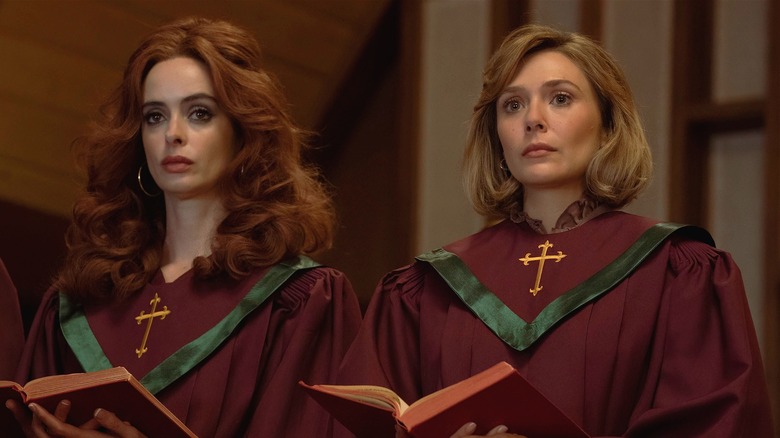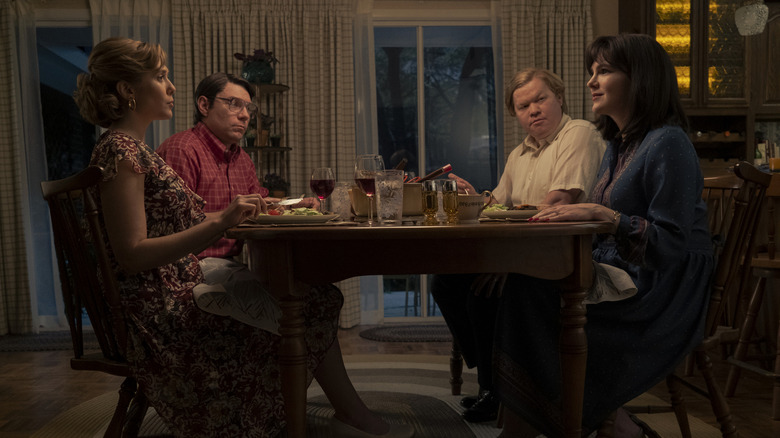Love & Death Review: A Chilling Showpiece For Elizabeth Olsen
- Elizabeth Olsen somehow makes her murdering housewife bright and loving
- Strong supporting turns from Jesse Plemons and Patrick Fugit
- Betty is a one-dimensional character
If there's one genre that people can't get enough of, it's true crime. But when it comes to real-life murder stories, there's not a ton of daylight between the glitzy, big-budget productions from Netflix or Hulu and the more humble Lifetime offerings in terms of plot. They all follow basically the same template in the same heightened version of reality. However, with higher production values comes the ability to hire someone like, say, Elizabeth Olsen in your lead role of the merry murderess, and that makes all the difference. "Love & Death" lives and dies on the strength of her penetrating performance as a cheerful suburban mom in 1980s Texas who shocked the world by moonlighting as an axe murderer.
Candy Montgomery's (Olsen) life revolves around her church and her family. She's the ever-dutiful housewife who can always be counted on to have a smile on her face and a fresh batch of cookies in the oven. But she's also quietly discontented, her vibrancy stifled by an emotionally and sexually unfulfilling marriage to her husband Pat (Patrick Fugit). She begins to fixate on the potential of having an affair with Allan Gore (Jesse Plemons), a man from her church who is going through a bit of a rough patch with his wife Betty (Lily Rabe). After the two painstakingly map out their rules of engagement, so to speak, they begin meeting up in secret at a local motel. But while their attraction and emotional connection to one another grows, they struggle to reconcile this relationship with their desire to fix their own marriages. The affair fizzles out on its own, but the repercussions of it ultimately caused one of the most dramatic court cases of the early 1980s, when Candy was tried for Betty's murder.
Elizabeth Olsen's raw power
From the very first moments of "Love & Death," it's clear that Elizabeth Olsen is the star of the show. In a weird way, she's the only truly active character in the entire production — it's her sheer force of personality that sets the sordid events in motion, her desire for emotional intimacy creating a snowball effect that ends with a suburban housewife with an axe sticking out of her skull. The men in her life, both her husband and her lover, are passive to a fault. They go along with whatever she says, whether it's "Hey, do you want to have an affair?" or "I think we should go to this marriage counseling conference/potential cult." None of this is done with malice or negative intentions — Candy is 100% driven by love. But it can take her to some dark places.
The most compelling aspect of Olsen's performance is how well she brings to life Candy's ability to compartmentalize. This might be the only television show about a tawdry affair where the two adulterers have multiple planning sessions to iron out all the details of what their arrangement will look like. This is how Candy is fully able to separate these two aspects of her life — when she's with her family, the affair doesn't exist, and when she's with Allan, the opposite is true. This extends to her reaction after the murder takes place, how she is able to calmly walk out of Betty's house and turn up at church minutes later as though nothing is wrong. It's chilling, but there's also an odd sense of optimism to it that is incredibly interesting to watch unfold.
The men in her life
Jesse Plemons and Patrick Fugit both prove their worth as supporting actors who know when less is more. They cede the spotlight to Elizabeth Olsen, and their performances are subtle yet emotionally effective. Fugit especially has an utterly thankless job as a milquetoast husband who is so oblivious to his wife's needs that he doesn't realize when she's been stepping out on him with a close family friend. Yet he somehow manages to give the character of poor, hapless Pat such a meaningful arc. He goes from being essentially wallpaper in his own home to someone who makes a decision to be engaged in Candy's turbulent life, even as he's coping with his own extremely complicated feelings of hurt and betrayal.
If there's anyone who is done dirty by "Love & Death," it's undoubtedly Betty. In an effort to center Candy in both the show and our hearts, Betty is depicted as a neurotic, waspish woman who demands too much from her long-suffering husband, picks fights with the local pastor, and is seemingly on the verge of a breakdown at all times. Lily Rabe does her best with the material, but as much as "Love & Death" wants to humanize and extend grace to Candy, it is seemingly uninterested in doing the same for Betty. The show might have been stronger if we weren't so fully in Candy's corner throughout the entire time, and had permission to sympathize with rather than pity her.
Despite this, "Love & Death" is a more than worthy contribution to the true crime genre. It's undoubtedly a showpiece for Olsen, who carries the lion's share of the emotional lifting, although she has a strong supporting cast around her. The show vividly brings to life a small-town Texas community that is equal parts nurturing and oppressive, as well as the extremes that its housewives are driven to in an attempt to fit into a very rigid definition of the perfect suburban life. Candy is bored and unfulfilled, Betty is hanging on by a razor's edge, and their lives are tragically and irrevocably altered because of it.
"Love & Death" premieres its first three episodes on HBO Max on April 27, with one episode debuting each following week until May 25.


